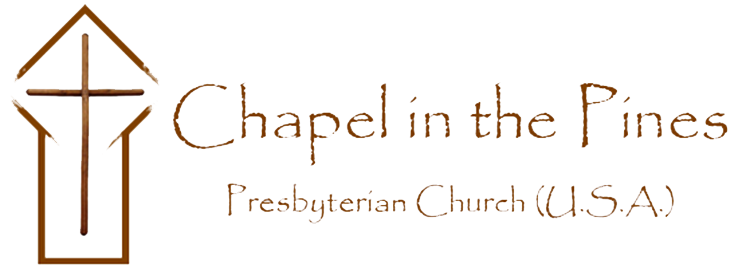Become A Member

Joining Chapel in the Pines
Welcome to Chapel in the Pines!
Here is a brief description of the steps you’ll take to become a member of Chapel in the Pines.
Contact the Pastor
The first step is to contact the Pastor and discuss your interest in becoming a member. That gets the ball rolling!
Meet with the Welcome and Membership committee; motion to Session
The membership committee meets on the first Thursday of each month, at 6:300 p.m. You’ll get an invitation to attend this meeting. The committee will then present a motion to the Session to add you to the church community! That is your official entry to the church!.
Choose your date to join
After meeting the membership committee, Andrew will contact you about a date to join, usually the second Sunday of the month. New members are typically introduced at the 11:00 service, but you can join during the 9:15 service if you prefer.
Fill out online form
Once the date is set, you can fill out the new member form(s) online. (Available HERE) You’ll fill out one for each adult joining and a different form for each child. We will need a brief biography to introduce you to the congregation in a newsletter.
Joining Sunday
On the Sunday when you join, Andrew will introduce you to the congregation. We will take your photo for the online directory if you haven’t already submitted one.
Welcoming you into the church community
After you’ve committed to join, there are two assignments we’ll make for you:
- New member friend – The Welcome and Membership committee selects a “new member friend” (NMF) for you. Your NMF acts as your guide, your mentor, and your confidante. They will help introduce you to other members, help you find your place in the church, get to know you better, and smooth your transition.
- Deacon – The congregation is divided into geographic neighborhoods and each has a Deacon assigned to it. Your Deacon is determined by which neighborhood you live in. Deacons are the caregivers of the congregation. If you have any personal needs, you can contact your deacon in confidence.
Once you’re a church member, you’ll meet with your NMF, at a mutually convenient time. You can explore the various committees and pitch in where your gifts take you. Your deacon will touch base with you periodically to see that you’re okay and if you need any help. You’ll be asked to help out with your fellowship team for one or two months of the year. You can take advantage of the many outreach, educational, social, and spiritual events that the church has to offer!
Online Resources
When you join, you’ll receive an invitation to set up an account on Realm, which is the church’s database. Realm gives you a directory of everyone in the church, as well as tracking your donations.
What it means to be a member of a Presbyterian Church
The Presbyterian church is distinct from other Christian churches in several ways. A good place to start to learn about the church is Presbyterian 101, from which this excerpt is taken.
In its confessions, the Presbyterian Church (USA) expresses the faith of the Reformed tradition. Central to this tradition is the affirmation of the majesty, holiness, and providence of God who creates, sustains, rules and redeems the world in the freedom of sovereign righteousness and love. Related to this central affirmation of God’s sovereignty are other great themes of the Reformed tradition:
- The election of the people of God for service as well as for salvation
- Covenant life marked by a disciplined concern for order in the church according to the Word of God
- A faithful stewardship that shuns ostentation and seeks proper use of the gifts of God’s creation
- The recognition of the human tendency to idolatry and tyranny, which calls the people of God to work for the transformation of society by seeking justice and living in obedience to the Word of God
The Book of Order is Part II of the Constitution of the Presbyterian Church (U.S.A.) and contains the Foundations of Presbyterian Polity, the Form of Government, the newly approved Directory for Worship, and the Rules of Discipline. You can browse through or search it for interesting details. Chapter One : The Mission of the Church is a good place to dip a toe.
The excerpt below is from the Book of Order’s section on membership. It is a good refresher of what it means to be an engaged member in a PC(USA) congregation.
Membership in the Church of Jesus Christ is a joy and a privilege. It is also a commitment to participate in Christ’s mission. A faithful member bears witness to God’s love and grace and promises to be involved responsibly in the ministry of Christ’s Church. Such involvement includes:
- proclaiming the good news in word and deed,
- taking part in the common life and worship of a congregation,
- lifting one another up in prayer, mutual concern, and active support,
- studying Scripture and the issues of Christian faith and life,
- supporting the ministry of the church through the giving of money, time, and talents,
- demonstrating a new quality of life within and through the church,
- responding to God’s activity in the world through service to others,
- living responsibly in the personal, family, vocational, political, cultural, and social relationships of life,
- working in the world for peace, justice, freedom, and human fulfillment,
- caring for God’s creation,
- participating in the governing responsibilities of the church, and
- reviewing and evaluating regularly the integrity of one’s membership, and considering ways in which one’s participation in the worship and service of the church may be increased and made more meaningful.
We’re glad you’re here!
